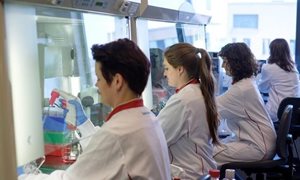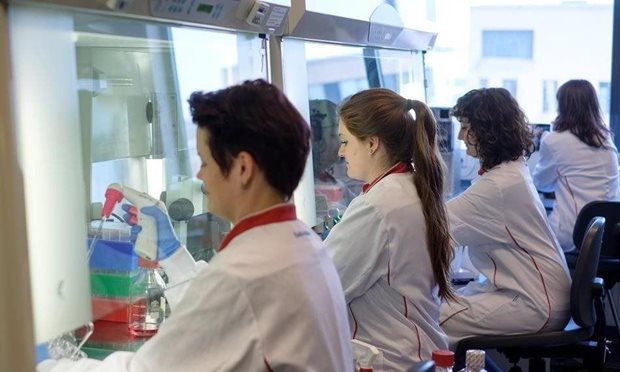

Stem cells Expertise and services
Our technology center assists investigators in performing innovative research, ranging from molecules to man. It connects a broad range of research groups that have expertise in different stem cell fields with a focus on human induced Pluripotent Stem Cell (iPSC) technology. read moreStem cells Expertise and services
The Radboudumc Stem Cell Technology Center assists investigators in performing innovative research, ranging from molecules to man. It connects a broad range of research groups that have expertise in different stem cell fields with a focus on human induced Pluripotent Stem Cell (iPSC) technology. This provides a state-of-the-art service to reprogram different cell types into iPSCs that enable the development of an unlimited source of any type of human cell needed for study or therapeutic purposes.Aims
- To generate experimentally validated human iPSCs: reprogrammed iPSCs are analysed for their stemness by quantitative reverse transcription and immunocytochemistry, and the characterisation can be extended to genomic integrity and differentiation capacities into the three germ layers.
- iPSC culture training and consultancy
- Consultancy of iPSC differentiation methods
- Consultancy on other stem cell cultures: human haematopoietic stem cells, human epidermal stem cells, human organoids, mouse embryonic stem cells (serum and 2i conditions)
- Joint expertise in different research fields: cell biology, genomics and epigenomics.
- Research projects based on collaboration
Areas of expertise
- Different stem cell fields with a focus on human iPSC technology
- Dermatology
- Epigenetics
- Genetics
- Haematology
- Neurobiology
- Tissue regeneration
Services
-
Reprogrammed cell lines- Peripheral blood mononuclear cells (PBMCs)
- EBV-immortalised lymphocytes
- Skin fibroblasts
- Urine-derived renal tubular cells
- Pericytes
Reprogramming vectors
- Lentivirus
- Sendai virus
- Episomes
Table 1. Overview of reprogramming options
-
- Immunofluorescence → Oct4, Nanog, SSEA4, Tra-1-81
- qPCR → Oct4, Dnmt3, Lin28, Sox2
- Karyotyping
- CNV analysis
- Trilineage differentiation
-
Culture and expansion of freshly-reprogrammed cells or purchased cells.
-
- living cells in culture or frozen vials
- cell pellets
- RNA or cDNA samples
-
The Stem Cell Technology and differentiation Center collaborates with many experts to offer a differentiation service into several cell types.
We are actively developing protocols for differentiation of iPSCs and hESCs into:- Retinal cells:
- retina pigmented epithelium (RPE)
- photoreceptor progenitor cells (PPCs)
- retinal organoids
- Neural cells
- Testicular cells
- testicular organoids
- Epithelial cells
- Bioprinting: pluripotent or partly differentiated cells can be printed into determinate structures with a very big choice of biological scaffolds (Bioinks)
- Retinal cells:
-
Cas9 or 12-mediated repair of mutations in iPSC or fibroblast lines.
The service includes design and testing of at least two sgRNAs, repair of the genomic mutation using Cas9 or 12/sgRNA ribonucleoproteins (RNPs), and pluripotency analysis of at least one selected isogenic subclone per disease.
Off-target analysis is not included in this service.
-
- Disease modelling
- Drug repurposing
-
SCTC pricelist 2025
-
The RTC Stem cells is part of these organizations:
- Dutch techcentre for life sciences (DTL). In 2017 the SCTC became a technology hotel.
- human Organ and Disease Model Technologies (hDMT).
Application of stem cell technology
Human induced Pluripotent Stem Cells (iPSC) can be used to study disease mechanisms. read moreApplication of stem cell technology
iPSCs can be used to study disease mechanisms. For example, patient-derived iPSCs can be differentiated into cells, tissues and organs that are normally not available from patients, to identify genetic (e.g. at the mRNA level) and cellular defects in patients. They also provide a platform for developing therapeutic approaches, such as drug screening, gene correction and cell-based strategies, for an individual or a large number of patients.- Stem Cell Applications
- Fundamental studies of development
- Genetic studies of diseases
- Disease modelling
- Drug screening
- Regenerative medicine
Our experts
-
Silvia Albert researcher postdoc genetica
-
Anke van Dijk researchanalist
-
Tessa Lips-van der Heijden researchanalist
-
Louet Koolen analist




